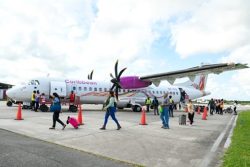WASHINGTON, (Reuters) – The Trump administration said yesterday it was deploying more U.S. Navy warships and aircraft to the Caribbean to prevent drug cartels and “corrupt actors” like Venezuelan President Nicolas Maduro from exploiting the coronavirus pandemic to smuggle more narcotics.
President Donald Trump said he was doubling U.S. military resources in the region, including destroyers, surveillance planes and personnel, in an anti-drug crackdown to deal with what he called a “growing threat.”
The beefed-up operation – quickly dismissed by the Maduro government – will also call for sending Navy ships closer to Venezuela, according to a U.S. official and two people familiar with the matter, who spoke on condition of anonymity. But it was unclear how close they would get to Venezuelan shores, the sources said.
Trump, joined by Defense Secretary Mark Esper and Joint Chiefs of Staff Chairman Mark Milley, made the announcement at the start of the White House’s daily briefing on efforts to battle the spreading pandemic.
It followed the indictment last week of Maduro and more than a dozen current and former officials on charges of narco-terrorism conspiracy, drug trafficking and corruption.
Maduro has remained in power despite a wide-ranging U.S.-led campaign of sanctions and diplomacy, something U.S. officials have privately said is a source of frustration for Trump.
On Tuesday, the Trump administration offered, however, to begin lifting Venezuela sanctions if the opposition and members of Maduro’s Socialist Party form an interim government without him, marking a shift in a U.S. policy.Trump said Wednesday’s move was needed because cartels and others were trying to take advantage of a pandemic that has required massive resources from United States and other countries. “We must not let the drug cartels exploit the pandemic to threaten American lives,” he said.
Esper also pointed a finger at Maduro’s government.
“Corrupt actors, like the illegitimate Maduro regime in Venezuela, rely on the profits derived from the sale of narcotics to maintain their oppressive hold on power,” he said. “The Venezuelan people continue to suffer tremendously due to Maduro’s criminal control over the country.”
Venezuela’s government said in a statement it “energetically rejects” the administration’s announcement, calling it an effort to distract from incompetent U.S. handling of the coronavirus outbreak. Maduro has dismissed last week’s criminal charges as false and racist.
The increased naval deployment could ratchet up pressure on Maduro and his allies but is not a prelude to U.S. military action against Venezuela, one person familiar with the matter said.
Although Trump has insisted that all options are on the table against Maduro, U.S. officials have made clear there is little appetite for military force, which could entangle the United States in another foreign conflict.
Federal prosecutors last week accused Maduro and his alleged accomplices of shipping tons of cocaine into the United States each year, using the drugs as a “weapon.”
U.S. officials have long accused Maduro and his associates or running a “narco-state,” saying they have used proceeds from drugs transshipped from neighboring Colombia to make up for lost revenue from a Venezuelan oil sector hit by U.S. sanctions.
The United States and dozens of other countries have recognized opposition leader Juan Guaido as Venezuela’s legitimate president, regarding Maduro’s 2018 re-election as a sham.
But Maduro has remained in power, backed by the country’s military and by Russia, China and Cuba.
Secretary of State Mike Pompeo announced on Tuesday the administration’s power-sharing transition plan, which proposed for the first time a “sequenced exit path” from tough U.S. sanctions, including on the vital oil sector, if Maduro and his allies cooperate.
But it will be no easy task to draw Maduro or his associates onto a path of political reconciliation with Guaido. Maduro has shown no willingness to seriously negotiate an end to his rule.





